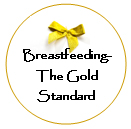| Breastfeeding: It’s a Good Start!
|

The Office of Minority Health (OMH) needs your help in spreading the word about the benefits of breastfeeding. Today is a good time to start. OMH is encouraging you to help increase awareness about the benefits of breastfeeding and support breastfeeding mothers all year long.
Breastfeeding Recommendations
Babies should be fed with breast milk only for the first six months of life. The American Academy of Pediatrics recommends that breastfeeding continue for at least 12 months, and thereafter for as long as mother and baby desire. Solid foods can be added to the baby's diet, while continuing to breastfeed, when the baby is six months old. For at least the first six months, breastfed babies don't need supplements of water, juice, or other fluids. These can interfere with milk supply if they are introduced during this time. One of the best things that only a mom can do is to breastfeed her baby for as long as possible.
Studies show that many mothers start breastfeeding, but few actually continue. In the U.S., 72% of women initiate breastfeeding. However, less than 40% of women are exclusively breastfeeding by three months. Only about 39% of women are breastfeeding exclusively at 3 months or in combination with formula for the recommended 6 months. Far fewer, less than 14%, are exclusively breastfeeding for the recommended 6 months. African American women have the lowest breastfeeding rates when compared to other population groups. Mothers who are socioeconomically disadvantaged, less educated, and younger also have low breastfeeding rates.
The longer a mom and baby breastfeeds, the greater the benefits are for both mom and baby. Breast milk is best, but if a mom is not able to exclusively breastfeed the baby, the important thing is to breastfeed as much as she can. Even if she is able to do it for only a short time or supplement breast milk with formula, the baby's immune system can benefit from breast milk.
Everyone Benefits
There are many breastfeeding benefits for babies, mothers, and society. Babies who are breastfed receive health and immune system, developmental, psychological, social, economic, and environmental benefits. Research indicates that women who breastfeed may have lower rates of certain breast and ovarian cancers. Society also benefits because breastfeeding yields health care savings, less missed work and less environmental waste.
Here are just a few reasons to encourage breastfeeding:
FOR BABY:
- Greater protection from infections:
Breast milk contains antibodies that can protect infants from bacterial and viral infections, such as diarrhea, lower respiratory infection, ear infections, bacteremia, bacterial meningitis, botulism, urinary tract infection, and necrotizing enterocolitis. - Best nutrition:
Breast milk is the most complete form of nutrition for infants. A mother's milk has just the right amount of fat, sugar, water, and protein that is needed for a baby's growth and development. - Higher IQs:
Breastfed babies score slightly higher on IQ tests, especially babies who were born pre-maturely. - Easier to digest:
Most babies find it easier to digest breast milk than they do formula. - Lower risk for obesity:
Breastfed infants tend to gain less unnecessary weight and tend to be leaner. This may result in being less overweight later in life. - Improved Development of Premature Babies: Premature babies do better when breastfed compared to premature babies who are fed formula.
FOR MOM:
- Lower risk of cancers and other diseases:
Breastfeeding lowers the risk of breast and ovarian cancers, and possibly the risk of hip fractures and osteoporosis after menopause. - Lose weight:
Nursing uses up extra calories, making it easier to lose the pounds of pregnancy. - Help uterus return to size:
It helps the uterus to get back to its original size and lessens bleeding a woman may have after giving birth. - Delay menstrual cycle:
Breastfeeding, especially exclusive breastfeeding, delays the return of normal ovulation and menstrual cycles. (You should still talk with your doctor or nurse about birth control choices.) - Save time and money:
You do not have to purchase, measure, and mix formula. There is no need to warm bottles in the middle of the night. - Bond with baby:
Breastfeeding can help a mother bond with her baby. Physical contact is important to newborns and can help them feel more secure, warm and comforted. Breastfeeding mothers may have increased self-confidence and feelings of closeness with their infants.
FOR SOCIETY:
- Save money:
Breastfeeding saves on health care costs. Total medical care costs for the nation are lower for fully breastfed infants than never-breastfed infants since breastfed infants typically need fewer sick care visits, prescriptions, and hospitalizations. - Less missed work and costs:
Breastfeeding contributes to a more productive workforce. Breastfeeding mothers miss less work, as their infants are sick less often. Employer medical costs also are lower and employee productivity is higher. - Less waste:
Breastfeeding is better for our environment because there is less trash and plastic waste compared to that produced by formula cans and bottle supplies.
Making a Difference
Here are a few tips to help promote breastfeeding:
- Spread the word about the benefits of breastfeeding to your family and friends.
- Support breastfeeding mothers-at home, at work, and in your community.
- Learn about breastfeeding know how and tips to cope with challenges.
- If you are a new mom, try to exclusively breastfeed for 6 months and continue breastfeeding for a year in combination with solid foods. Talk to your health provider about introducing solid foods. Learn about the few cases when women should not breastfeed.
Where to go for Help
National Women's Health Information Center, OWH, HHS
- National Breastfeeding Hotline: 1-800-994-9662
- Publications:
- English (all women) [PDF, 1.5MB]
- English (African American Women) [PDF, 1.2MB]
- English (American Indian and Alaska Native Women) [PDF, 1.3MB]
- Spanish [PDF, 850KB]
- Chinese [PDF, 4.5MB]
The Centers for Disease Control and Prevention, HHS
The National Institute of Child Health and Human Development, NIH, HHS
The American Academy of Pediatrics 
International Lactation Consultant Association (ILCA) 
Maternal and Child Health Bureau, HRSA, HHS
The Office of Minority Health Resource Center is here to serve you. Call 1-800-444-6472.
You will need Adobe Acrobat® Reader™ to view PDF files located on this site. If you do not already have Adobe Acrobat® Reader™, you can download here for free.



